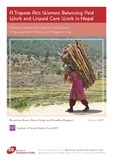| dc.contributor.author | Ghosh, Anweshaa | |
| dc.contributor.author | Singh, Anjam | |
| dc.contributor.author | Chigateri, Shraddha | |
| dc.coverage.spatial | Nepal | en |
| dc.date.accessioned | 2017-10-06T11:50:25Z | |
| dc.date.available | 2017-10-06T11:50:25Z | |
| dc.date.issued | 2017-10 | |
| dc.identifier.citation | Ghosh, A., Singh, A. and Chigateri, S. (2017) A Trapeze Act: Women Balancing Paid Work and Unpaid Care Work in Nepal. National Report, Brighton. IDS. | en |
| dc.identifier.uri | https://opendocs.ids.ac.uk/opendocs/handle/20.500.12413/13261 | |
| dc.description.abstract | Despite high rates of labour force participation by women in Nepal, there has been very little engagement by communities and the state on the issue of women’s ‘double burden’ of balancing unpaid care work with paid labour activities. The ‘Balancing paid work and unpaid care work – Nepal’ research study aims to create knowledge about how women’s economic empowerment (WEE) policy and programming can generate a ‘double boon’, i.e. paid work that empowers women and provides more support to their unpaid care work responsibilities. Research discussed in this report looks at two WEE programmes in Nepal: (1) a state programme, the Karnali Employment Programme; and (2) a non-state programme, Oxfam Nepal’s Enterprise Development Programme. One of the stark conclusions of the study is that women are currently unable to balance their paid and unpaid care work due to several factors: the lack of availability of decent employment opportunities in rural areas; a lack of quality public resources and services; migration of men; a lack of assets such as land; and prevailing gender norms, especially around women’s participation in unpaid care work and mobility. The report makes recommendations at state, non-state, market, community and family levels. Programmes aimed at women’s empowerment need to have a care perspective in their design and implementation, and grass-roots-level communication and advocacy needs to be encouraged and implemented, in order to reduce women’s ‘double burden’ and move towards a’ double boon’. | en |
| dc.description.sponsorship | Department for International Development (DFID) | en |
| dc.description.sponsorship | William and Flora Hewlett Foundation | en |
| dc.description.sponsorship | International Development Research Centre (IDRC) | en |
| dc.language.iso | en | en |
| dc.publisher | Institute of Development Studies / The Institute of Social Studies Trust (ISST) | en |
| dc.rights.uri | http://creativecommons.org/licenses/by-sa/3.0/ | en |
| dc.subject | Gender | en |
| dc.subject | Livelihoods | en |
| dc.title | A Trapeze Act: Women Balancing Paid Work and Unpaid Care Work in Nepal | en |
| dc.type | Other | en |
| dc.rights.holder | Institute of Development Studies / The Institute of Social Studies Trust (ISST) | en |
| rioxxterms.funder | Default funder | en |
| rioxxterms.identifier.project | Default project | en |
| rioxxterms.version | NA | en |
| rioxxterms.funder.project | 9ce4e4dc-26e9-4d78-96e9-15e4dcac0642 | en |


